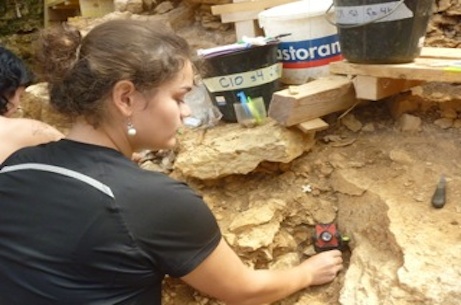
Victoria Tobolsky is researching the evolution of the human pelvis.
Why is childbirth sometimes so difficult, compared to the experience of other animals?
Victoria Tobolsky [2012] is looking for clues in our evolutionary history. She is studying modern women’s pelvic capacity and its links to childbirth difficulties. Her interest centres on how factors like nutrition and an unstable environment impact on pelvic development, but she is not looking at these from a recent comparative perspective. Her research spans thousands of years of human development.
“I am interested in how the pelvis was remodelled over millions of years to support upright walking, while all the while our brains were getting bigger and bigger. I examine not only the relationship between the two, but what the obstetric implications might be for modern humans.” It’s not an easy job. “There is a extraordinary dearth of pelvic fossils,” she says. “The bony pelvis is very delicate and frequently breaks, so often you’re forced to piece together impartial fragments. It’s like trying to read a hidden message buried in a jigsaw puzzle, but you only have half the pieces.”
Victoria [2012] has a keen interest in history and grew up surrounded by it. Born in Philadelphia, one of the oldest US cities, she was always drawn to the past. Her mother’s family moved from Poland and her father’s family is Russian and she has a keen sense of her family history. However, she was also always drawn to medicine and had a fascination with the human body from an early age.
Victoria, who has an older sister, was on a gifted student programme at elementary school. At middle and high school her main interest was science. She had wanted to be a doctor since she was four and her father brought home a pop-up book on anatomy.
At high school she sang in musicals and trained as a classical opera singer. It was not until she started college that she stopped singing professionally, but she still sings for her own pleasure. “It makes me happy,” she says, “I considered studying music at college, but I didn’t want to devote my career to it. I do it for me. It keeps me grounded.” She also taught herself to play the flute.
Princeton
However, it was a medical career that she was set on when she left school and she started a pre-med course at Princeton. Her parents had met and married there, but Victoria was more led by the courses it offered. She took classes in evolutionary biology and ecology, but in her second year switched to studying anthropology where she focused on human evolutionary biology. This followed a trip to Bordeaux to study cognitive evolution and whether it was possible to find a dividing line between humans and Neanderthals.
“I became interested in how we became human and this brought together my interest in history and my fascination with the body,” she says. “We studied the prehistoric cave paintings in the Dordogne. It was so special to think there were people there 18,000 years ago who painted them.” She also visited the dig site of a Neanderthal hunting ground. “It just brought it home to me that there was a person thousands of years ago who made that tool.”
In her third and fourth year, she changed course again to anthropology and did her thesis on bipedalism. One chapter focused on the possible relationships between nut-cracking behaviour in chimpanzees and the origins of the oldest stone age technologies, which she presented at a recent conference.
Her thesis, entitled “Getting a Grip: Precision, Technological Evolution, and Hominin Evolution”, was co-awarded the Senior Thesis Prize in Anthropology by a panel of professors. She says her undergraduate research looked at how rising from a quadrupedal to a bipedal stance allowed hominids to use their hands for skills which were unrelated to movement, such as toolmaking. Victoria’s research suggested the propensity for tool use may possibly find very primitive roots in the primate lineage. She says: “It is likely that an ancient hominin cracking nuts produced incidental flakes, as do chimpanzees. That it saw its potential as a cutting implement, as have extant primates species like capuchins, and grasped the concept of lithic reduction, as has been proposed for bonobos, does not seem out of the behavioural repertoire of early hominins. Intentional flake production in the Oldowan [the earliest stone tool industry in prehistory] may have begun following these activities.”
Through an anthropology professor at Princeton, where she also did regular voluntary work with children with Down’s Syndrome, Victoria decided to apply to Cambridge. She won a Gates Cambridge Scholarship to do an MPhil in Human Evolutionary Studies to further her research by looking at pelvic development.
She explains her work as being about the human body’s capacity to adapt, and the possibility of harnessing that plasticity to help the body heal itself. “Doctors study how the body works; for instance, how the knee moves and functions. I am also curious as to why it has evolved to work that way, and what the health implications might be. Evolution is often a flawed system as reproduction, not perfection, is the only goal,” she says.












